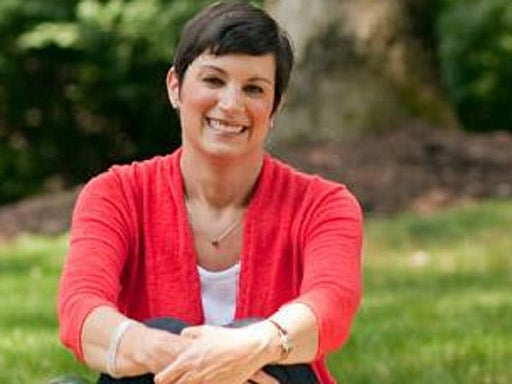Fighting talk: Should cancer sufferers describe their illness as a battle?
40-year-old mother-of-three's blog about her breast cancer that has spread to her bones sparks debate on both sides of the Atlantic

Your support helps us to tell the story
From reproductive rights to climate change to Big Tech, The Independent is on the ground when the story is developing. Whether it's investigating the financials of Elon Musk's pro-Trump PAC or producing our latest documentary, 'The A Word', which shines a light on the American women fighting for reproductive rights, we know how important it is to parse out the facts from the messaging.
At such a critical moment in US history, we need reporters on the ground. Your donation allows us to keep sending journalists to speak to both sides of the story.
The Independent is trusted by Americans across the entire political spectrum. And unlike many other quality news outlets, we choose not to lock Americans out of our reporting and analysis with paywalls. We believe quality journalism should be available to everyone, paid for by those who can afford it.
Your support makes all the difference.Lisa Bonchek Adams is a 40-year-old mother-of-three. She has breast cancer, and it has spread to her bones.
She writes about her condition, her treatment and her feelings – about what is now a terminal illness – on a blog and on Twitter, where she has several thousand followers and has tweeted more than 166,000 times.
Ms Adams, an American, has found herself the focus of critical articles in national newspapers in two countries – thrusting her into the centre of a debate about how we treat and talk about cancer.
The first article, which appeared in The Guardian, questioned “the ethics of tweeting a terminal illness”. The piece, by Emma Gilbey Keller asked: “Should there be boundaries in this kind of experience? Is there such a thing as TMI [too much information]?” It has been removed from the paper’s website, amid an internal investigation.
The second piece, by Ms Keller’s husband, the former New York Times executive editor Bill Keller, contrasted Ms Adams, who has tried therapies and enrolled on trials of new drugs in a bid to slow the progress of her disease, to the writer’s father-in-law, who died from cancer in a British hospital in 2012, after being “offered the option of being unplugged from everything except painkillers and allowed to slip peacefully from life”.
He said Ms Adams was “the standard-bearer for an approach… that honours the warrior, that may raise false hopes, and that, implicitly seems to peg patients like my father-in-law as failures.”
Ms Adams – and many others – were outraged. “I am alive. Do not write me off & make statements about how my life ends TIL IT DOES, SIR,” she wrote on Twitter. Other commentators jumped to her defence. Writing in the New Yorker, Meghan O’Rourke criticised Mr Keller for treating Ms Adams’ “personal choices as an occasion for moral legislation”.
Ismena Clout, who has incurable secondary breast cancer and blogs for The Independent, said that while she disliked the “fighting” cancer metaphor, patients had a right to talk about and act on their condition in their own way.
“When you’ve got someone going through such an horrific time… finding the energy to write about it, to help educate and raise awareness, then that should be commended, not derided,” she said.
Dr Emma Pennery, clinical director at UK charity Breast Cancer Care agreed. “We tend not to use the “battle” terminology. It implies you have control of the battle – that’s not a realistic expectation,” she said. “But there is no way you can say one way of speaking about cancer is right and one way is wrong.”
@adamslisa: The patient’s tweets
30 December
Articles about “defiant patients” who “refuse” to accept prognoses continue to reinforce the BS that attitude determines long term survival.
4 January
Very rough day here. Dizziness, weakness, pain. Need the tumors to shrink for relief. That will take time: chemo and radiation.
7 January
If any of my healthy friends lived this life for 5 minutes their heads would explode. I know mine is ready to and I live it every day now.
8 January
“Why is she tweeting if it hurts so much?” I am sure people ask. It helps to distract me especially when I am alone (it’s 6 AM here).
Join our commenting forum
Join thought-provoking conversations, follow other Independent readers and see their replies
Comments